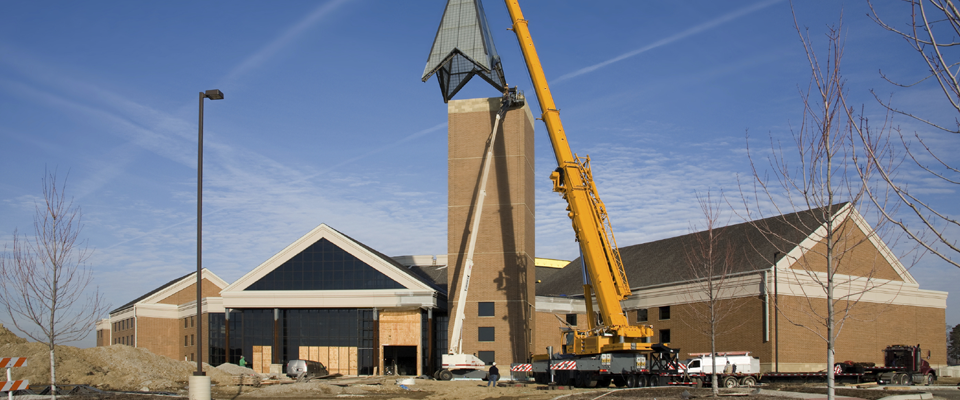As you undertake a church facility expansion, be prepared for these 9 challenges.
1. Zoning
When purchasing an existing building or land, confirm that churches are considered an allowable use on that property by checking with the responsible local governmental entity. If they are not, rezoning the property can take time and money with no guarantee of approval. You will also need to look at the zoning of your current facility if your expansion requires a building permit—zoning codes may have changed.
Watch Dr. Richard Hammar's advice on zoning for churches.
2. Land Use Code
This extends beyond zoning to include requirements such as green space, landscaping, lot coverage ratios, square footage, height, setbacks, and many other issues. Consult a local civil engineer early in the planning process. They can assist with the initial feasibility of your project by defining the physical parameters for expansion.
3. Inspections
If you purchase an existing building or vacant property, obtain a fully detailed building inspection and code review. These will reveal the property's true condition, including the building and all its systems and components so you'll know exactly what you are buying. Additionally, a Phase I Environmental Site Assessment is recommended to determine if there are any environmental concerns.
Not only will this information be helpful in negotiating a purchase price, but it's also critical for accurately projecting your project budget. Walk the building with a contractor and code expert to get an idea of the cost of code compliance.
4. Building Code
Building codes ensure the minimum level of structural and mechanical integrity during construction and remodeling. Occupancy codes are part of this and can be of particular concern when renovating an existing building into a church. We have seen car dealerships, big-box stores, theaters, warehouses, and many other buildings renovated for use by churches, but this is not always simple or inexpensive.
5. Cost
Do not use assumed cost-per-square-foot numbers. Talk with local builders who can provide current construction costs. Although it is difficult to get an exact cost before a project is fully designed, a qualified contractor can give you an accurate range, which can be refined as the design is developed. Keep in mind, construction isn't the only cost. Be sure to allow for chairs, a sound system, lighting, and other items. In addition, your operating budget may be impacted after the project, due to increased utilities, maintenance, or staffing.
6. Design
Most successful church projects are a result of some form of design-build process, whether the architect and builder are one entity or are separate entities coordinating their efforts. Most architects, whether they specialize in church design or not, can design your project. The question is, do you truly need design work? Many churches initially just need help with space planning and programming in order to better define the project—a service most builders offer.

7. Contracts
The first consultant we typically recommend a church hire is a civil engineer. When it's time to begin programming and space planning, an architect or design-builder can help. However, do NOT enter into a long-term contract before your project is defined.
Contract only for what you need. If you simply want help determining your priorities and figuring out what a project might look like, most architects and design-builders can assist you. Ask for a master planning or initial programming contract.
As the project gets underway, be cautious of two types of contracts: 1) percentage-based design and 2) cost-plus construction without a not-to-exceed number. For design work, ask for a fixed-price contract, and for construction, ask for a guaranteed maximum price contract. This will prevent your church from having to pay for unanticipated cost overruns, except for items you choose to change.
8. Project Management
Beware of the tendency to underestimate the time, energy, focus, and resources a building project demands. Even if you are hiring a contractor, it is recommended that someone in your church or representing your church be appointed as the primary contact for project management and administration from the church's perspective.
9. Funding
Most church expansion projects are funded with a combination of at least two, if not all three of the following: funds on-hand, funds raised specifically for the project, and funds borrowed. Getting a handle on what you can afford while figuring out what you need to build and what it could cost is the right way to approach a building project. Buffer initial estimates with a contingency of 10-15%. As the design and pricing is refined, that contingency can be reduced. However, we recommend carrying a 5-10% contingency going into the project, even if you have a guaranteed maximum price contract.
Keeping all these points in mind will better prepare you to face the inevitable hurdles of church expansion. But before you start, make sure you've given full thought to the following: Who are you as a church? What has God called you to do? What should your facilities look like in order to make that happen? Are you maximizing your current ministry space? Remember, the best reason to expand is because it's necessary to accomplish what God has called you to do.
If you have questions or would like more information, feel free to email me at sfink@agfinancial.org or call 888.599.6015.
What expansion challenges has your church faced? Share your experience and tips below.



